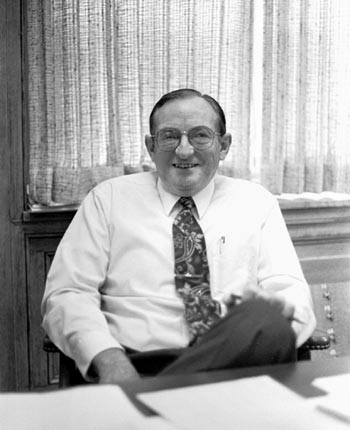|

|
|
Democrat Photo by John Emerson
Chief Clerk of Sullivan County Courts Earl Lilley at his desk
|
A Conversation With Chief
Court Clerk Earl Lilley
By John Emerson
MONTICELLO — August 18, 2000 – In almost 41 years on the job, Earl Lilley, the Chief Clerk of Sullivan County’s Supreme and County Courts, has seen a lot of changes within the justice system of New York State.
Lilley, 60, began his career in the court system in 1959 when Sullivan County Clerk Milicent Flynn was also the Clerk of the Court. She hired him as a young 19-year-old man from the Town of Bethel looking for a job. He was assigned to work with the legal proceedings that were the county clerk’s responsibility back then. Each county handled its own courts and had its own systems for doing things, a situation that wouldn’t change until 1977.
“The County Clerk was the Chief Clerk in those days,” Lilley said. “However the county clerk wanted things done is the way it was done.”
The big change came in 1977 when, under the auspices of Court of Appeals Chief Judge Lawrence Cooke, the state took over the court system. Former county employees became state employees, and the county clerks were stripped of their titles relating to the courts.
“There were a lot of problems and there was a lot of controversy over titles,” he said. “The county clerks were upset over having the courts taken away from them, and they didn’t like having somebody who used to work for them making more money than they got paid.”
When the change hit Sullivan County, the County Clerk was Joe Purcell.
Lilley was the Special Court Clerk under the old system and was appointed Chief Clerk of the courts. At that point, it was basically a one-person office, with Lilley the main person.
“I became the Chief Clerk, and things went from there,” he said. “There were a lot of people not happy about it. It took four or five years before things got worked out.”
Once things “worked out,” Lilley had two new employees and an office that was his responsibility. He was also the person people turned to for information and who lawyers referred to for which judge would hear their cases. That too was about to change.
“I guess from my viewpoint the biggest change in the legal system was when they started the individual assignment system for cases,” he said. “They did that to move cases through the system faster and more efficiently, but the lawyers didn’t like it at all. Before they had the IAS, they were always asking which judge was going to be sitting to hear their case. If they didn’t like the judge, they would wait and postpone it. It cut out judge shopping the way the lawyers used to do.”
Although it can still take years for a civil case to work its way through the system, the IAS is still faster and more efficient than the previous system. Now the delays are caused, for the most part, by the sheer numbers of cases filed.
Lilley said his courts handle more than 3,000 cases per year. Each case must be logged, tracked and followed through from start to finish. In many cases, evidence must be maintained for future appeals and a complete record be kept available. The paperwork involved is daunting.
“When we have a criminal case, we have to give reports to the Division of Criminal Justice Services, Department of Motor Vehicles, probation, the jail, the prison and of course to the lawyers,” he said. “We couldn’t exist without computers today.”
But that does not mean that Lilley has become a computer nerd. Fortunately, the people on his now six-member staff do the computer work.
“I’m not a computer person,” he said frankly. “For me, having to work with the computer makes the job harder.”
And while the Chief Clerk’s role is essentially administrative and supervisory, Lilley keeps his hand in by serving as the court clerk during trials, a job most other Chief Clerks hand off.
“I like being in the courtroom,” he said. “I like the action that goes on in the courtroom.”
Lilley said he has no plans to retire in the immediate future, even though his 41st anniversary within the court system will occur next month and he could begin drawing his retirement pension immediately.
For now, he is content with what he is doing.
“I enjoy the work and enjoy the people,” he said. “I have a real good staff, and I get real pleasure seeing that everything gets done and the people get served the way they should be.”
|

